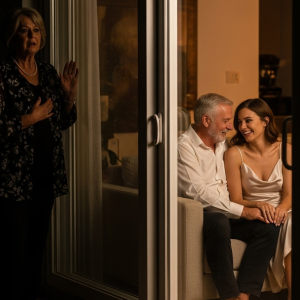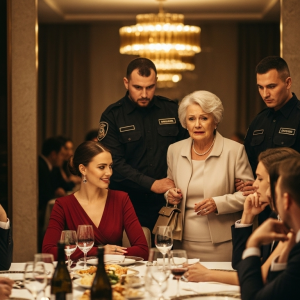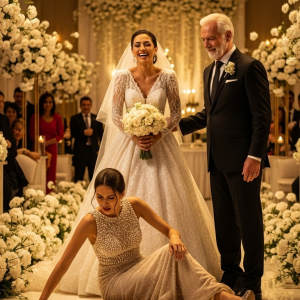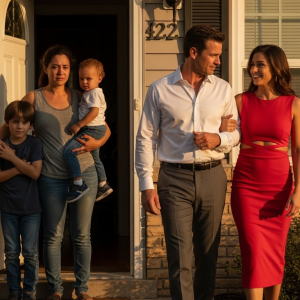I’m Abigail, 29, and I stood alone at my baby Emily’s funeral while my parents attended my brother’s pool party. My daughter was only six months old when SIDS took her from me. As I watched her tiny, white casket being lowered into the ground, my mother’s words echoed in my mind: “It’s just a baby. Your brother’s party matters more.” That day, something inside me shattered beyond repair.
Growing up, I always knew I was the lesser child. My brother, Jason, three years my senior, was the golden one. From the moment he was born, our parents, Margaret and Richard, created a family dynamic where his achievements were celebrated with extravagant parties, while mine were acknowledged with obligatory cards, if remembered at all. When Jason made the soccer team, they threw a backyard barbecue. When I was accepted into the honors program that same year, they simply said, “That’s nice, Abby,” before asking Jason about his upcoming game.
By high school, I’d accepted my place. I focused on building my own life, excelling in academics and forging friendships with people who valued me. I met Michael in college. He came from a warm, supportive family that initially felt alien. The way his parents showed genuine interest, remembered important events, and expressed pride in his accomplishments seemed almost theatrical to me, until I realized this was what normal family love looked like.
We married three years ago. We bought a small home about 40 minutes from my parents—a distance that was intentional on my part. When we announced our pregnancy, Michael’s parents were ecstatic, immediately planning the baby shower. My parents responded with, “Oh, that’s nice. Did Jason tell you he might get promoted?” They attended the shower my in-laws organized but spent most of it talking about Jason’s recent vacation.
Emily was born on a snowy January morning. Holding her for the first time, I felt a love so intense it physically hurt. Michael’s parents arrived at the hospital within hours, bearing gifts and tears of joy. My parents came the next day, stayed for exactly 45 minutes, and left when my mother remembered she had a hair appointment.
Over the next six months, Michael’s parents visited weekly. My parents visited exactly twice, and both times they held Emily awkwardly, as if she were a ticking bomb. Despite their indifference, I sent them weekly photo updates of Emily’s milestones. My mother would occasionally respond with a thumbs-up emoji. My father never responded at all.
Two months before Emily died, Jason announced his engagement. My parents immediately began planning an elaborate party, scheduled for the same weekend as Emily’s dedication ceremony at our church—an event they had already committed to attending.
When I reminded my mother of the conflict, she said, “Oh, we’ll have to miss the baby thing. This is Jason’s engagement, Abby. That’s a once-in-a-lifetime event.” I wanted to scream that a baby dedication also happens only once, but I swallowed the words, as I always had.
A week before Emily died, she developed a slight cold. Her pediatrician assured me it was a minor viral infection. I took a few days off work to care for her, and by the weekend, she seemed better. I had no way of knowing those would be our last days together.
It was a Tuesday night when our world collapsed. We put Emily to bed around 8 p.m. The baby monitor remained silent all night—too silent. When I woke at 6 a.m., something felt wrong. I went to her nursery. In her white crib, Emily lay still. Too still.
“Emily,” I whispered, touching her cheek. It was cold.
What happened next exists in my memory as disjointed fragments: my screams, Michael performing CPR on our daughter’s tiny body, my trembling fingers dialing 911, and a doctor with kind eyes delivering the worst news any parent could hear. “I’m so sorry. Your daughter died from what appears to be Sudden Infant Death Syndrome.”
Michael collapsed. I stood frozen. We had done everything right. Yet here we were, in a sterile hospital room, being asked if we wanted to hold our daughter one last time.
Eventually, I remembered to call my parents. “Mom,” I said when she answered, my voice breaking. “Emily… she died last night.”
There was a pause. “Oh, Abby. That’s terrible.” No gasp, no tears, no immediate promise to come. Just a flat acknowledgment.
“We need to arrange a funeral,” I continued, desperate for her to be a mother.
“Yes, I suppose you do. Let us know the details.” That was it. Michael’s parents, in contrast, were already on their way.
A few days later, my parents called to ask when the funeral would be. “Friday at 11 a.m.,” I told my mother.
“Friday?” she repeated. “Oh, dear. That’s the day of Jason’s pool party. We’ve already committed to that.”
I thought I’d misheard her. “Mom, this is Emily’s funeral. Your granddaughter’s funeral.”
“I understand that, Abby, but we can’t cancel on Jason now. All the arrangements are made. You understand, don’t you?”
“No, Mom, I don’t understand. Please explain it to me.”
She sighed, the sound crackling through the phone. “Abby, I know you’re upset, but think rationally. It’s just a baby. Emily was only here for a few months. You can always have another one. But Jason’s engagement is important to his future.”
The words hit me like physical blows. It’s just a baby. Your brother’s party matters more.
In that moment, the hurt was so profound it transformed into something else entirely. A cold clarity.
“I see,” was all I could manage before hanging up.
The morning of the funeral was cruelly beautiful. As we drove to the cemetery, I checked my phone, harboring a desperate hope that my parents had changed their minds. There were no messages from them. Instead, there was a text from Jason: Sorry about the baby. Hope the funeral goes okay. Excited to see everyone at the party later!
Emily’s casket was impossibly small, white with silver handles, adorned with pink roses. Michael stood beside me, his hand gripping mine so tightly it hurt. His parents flanked us, his mother openly weeping. Around us gathered friends, colleagues, and neighbors. The conspicuous absence of my parents and brother created a void that everyone politely pretended not to notice.
During the service, my phone vibrated in my purse. I ignored it. After the final prayer, I checked it briefly. Jason had posted photos from his pool party. My parents were prominently featured, smiling with champagne glasses in hand, celebrating while their granddaughter was being lowered into the ground.
The physical act of watching that tiny casket descend into the earth made Emily’s death real in a way nothing else had. My baby was gone, and I would never hold her again.
Later, at our house, I moved through the rooms like an automaton, accepting condolences. My parents didn’t call. They didn’t text. They didn’t visit. A week later, my mother finally called, her voice casual.
“Abby, how are you?”
“My daughter died and was buried without her grandparents present,” I replied flatly. “How do you think I am?”
“Now, Abby, there’s no need for that tone. We’re calling to invite you to Sunday dinner. It would be good for you to get out of the house. Jason and Stephanie will be there. They can tell you all about their wedding plans. It might take your mind off things.”
Take my mind off things. As if my child’s death were a minor inconvenience.
“I have to go,” I said, and hung up.
Against my better judgment, I agreed to the Sunday dinner two weeks after the funeral. I felt a morbid need to see them, to understand how they could act so normally.
My mother greeted us with air kisses. Jason and Stephanie sat on the couch, surrounded by wedding magazines. No one mentioned Emily.
During dinner, the conversation revolved entirely around Jason’s promotion and Stephanie’s dress shopping. Finally, I couldn’t take it anymore.
“Did Emily’s funeral interfere with your pool party?” I asked, my voice cutting through a discussion about wedding photographers.
The table fell silent. “Abby,” my mother said with a nervous laugh, “let’s not bring up unpleasant topics at dinner.”
“‘Unpleasant topics’?” I repeated. “You mean my daughter’s death? The funeral you skipped?”
“Now, Abby,” my father interjected. “What’s done is done. No sense dwelling on the past.”
“The past? It was two weeks ago!”
Jason rolled his eyes. “See, this is why we didn’t want to bring it up. You always make everything so dramatic, Abby.”
“Dramatic?” I stared at him, incredulous. “My baby died, Jason. And none of you came to her funeral because you were having a pool party.”
“It wasn’t just a pool party,” my mother said defensively. “It was a celebration of their engagement. We couldn’t cancel.”
“But you could miss your granddaughter’s funeral,” Michael said, his voice dangerously quiet. “You could tell my wife, ‘it’s just a baby,’ and that she can ‘always have another one.'”
“Actually,” my mother said, changing tactics, “several relatives asked where you were. We told them we couldn’t attend due to health issues. Your father’s back, you know.”
The revelation hit me like a physical blow. They were ashamed enough to lie, but not ashamed enough to show up.
“You lied?” I whispered.
“Well, we could hardly tell them we were at a pool party, could we?” my mother replied, as if this were perfectly reasonable.
“I don’t understand,” I said, standing up. “And I never will.”
Michael and I left without finishing dessert.
Over the next month, I began seeing a grief counselor, Dr. Patrice. When I explained what had happened, her professional demeanor slipped momentarily. “Have you always felt that your parents favor your brother?” she asked.
That question opened a floodgate. Week after week, I unpacked a lifetime of favoritism. Dr. Patrice introduced terms like “golden child” and “scapegoat.” I gained clarity: this wasn’t just about the funeral. It was about a lifetime of being treated as less than, culminating in the ultimate dismissal of my most profound loss.
“I need them to understand what they’ve done,” I told Michael one night. “Not just to me, but to Emily. To her memory.”
My first step was to decline the invitation to Jason’s official engagement party. “Michael and I won’t be attending,” I texted. “Still grieving our daughter’s death.”
The calls started immediately. “You can’t miss Jason’s party,” my mother insisted. “Family needs to stick together.”
“Family needed to stick together at Emily’s funeral,” I replied, and ended the call.
Next, I reached out to the extended family who had attended the funeral. “We were told your father’s back was acting up,” my Aunt Judith said.
“What if I told you they were at Jason’s pool party instead?” I asked quietly. The silence on the line was deafening.
After two months, I was ready. I texted my parents: “I’d like to meet with you to discuss moving forward. Just the three of us. This Sunday at 2 p.m.”
My mother replied immediately: “Wonderful! I’m so glad you’re ready to put this behind us. I’ll make your favorite lemon cake.”
The casualness only strengthened my resolve.
I sat opposite my parents in their pristine living room. I placed a framed photo of Emily on the coffee table between us.
“This is your granddaughter,” I said, my voice steady. “The Emily whose funeral you skipped to attend a pool party. The Emily you referred to as ‘just a baby.'”
My mother began to protest, but I held up my hand. “I’m not finished. For as long as I can remember, you have made it clear that Jason matters more. But when you chose to skip Emily’s funeral, when you dismissed her death, you crossed a line that can’t be uncrossed.”
I handed them a printed timeline of events, a record of their choices dating back to my childhood. They looked at the papers with expressions of mingled confusion and defensiveness. I then showed them the screenshots from Instagram, timestamped during Emily’s funeral service. My mother sipping champagne while I was listening to the eulogy. My father laughing with friends while I was throwing dirt onto my baby’s grave.
“What do you want from us, Abby?” my mother’s composure finally cracked. “We can’t change what happened.”
“No, you can’t,” I said. “But you can acknowledge it. You can recognize the pain you caused.”
“We’re sorry you were hurt,” my father said stiffly.
“That’s not an apology,” I pointed out. “That’s placing the blame on me for being hurt.”
Finally, I pulled out a letter I’d written and began to read. I told them everything. How their choice had invalidated Emily’s existence. How it was the culmination of a lifetime of being dismissed. And how, for my own well-being and to honor Emily’s memory, I needed to step back from our relationship.
“For now,” I read, “this distance is necessary. If someday you’re willing to truly acknowledge what happened, to take responsibility without excuses, then perhaps we can begin to rebuild. Until then, this is goodbye.”
When I finished, my mother was crying silently. My father sat rigid, his jaw clenched. “You can’t be serious,” he finally said. “Cutting us off over one missed event.”
“Robert,” my mother interrupted, her voice uncharacteristically sharp. She was looking at Emily’s photo. Really looking at it. “Stop.”
The room fell silent. She reached for the photo with trembling fingers. “She had your eyes,” she whispered.
“Yes,” I replied. “She did.”
“I never really looked at her,” my mother admitted, her voice barely audible.
“This isn’t something I can just get over,” I said, standing to leave. “This is my line in the sand. I’ve said what I came to say. The ball is in your court now.”
As I drove home, my phone lit up. Jason was sending angry texts. But several extended family members were sending messages of support. The narrative my parents had carefully constructed was crumbling.
In the months that followed, we established a new normal. I attended a support group. Michael and I saw our counselor together. And slowly, my family began to change.
Three months after our confrontation, a handwritten letter arrived from my father. We were wrong, he wrote. Terribly, unforgivably wrong. I don’t expect forgiveness, but I want you to know that I hear you, and I am sorry. It was the first genuine acknowledgment of my pain he had ever offered. A week later, my mother sent a custom-made ornament with Emily’s name and a pair of angel wings. The note inside read simply, “I should have been there. I will regret that choice for the rest of my life.”
Even Jason showed up at our door one afternoon with a small rose bush for Emily’s memorial garden. “I never really thought about how things looked from your side,” he admitted as we planted it together. “I’m sorry, Abby.”
These gestures didn’t erase the grief, but they lightened the additional burden of feeling unseen. We established careful boundaries, and slowly, a new, more honest relationship began to form. I started volunteering with an organization that supports parents who have experienced infant loss. My personal experience allowed me to connect with families in a way nothing else could. Working with them became my purpose—not to replace Emily, but to create meaning from the devastation of her loss.
On the one-year anniversary of Emily’s death, we held a small ceremony in her garden. Michael’s parents were there, steady as always. My parents came, too, standing respectfully at the edge of the garden. As we released balloons into the sky, I felt Emily’s presence in the impact she had left on all of us. In her death, she had taught us about the fragility of life. And in the aftermath, she had taught me about the power of standing up for the truth.
I had lost my daughter, but I had found my voice.




